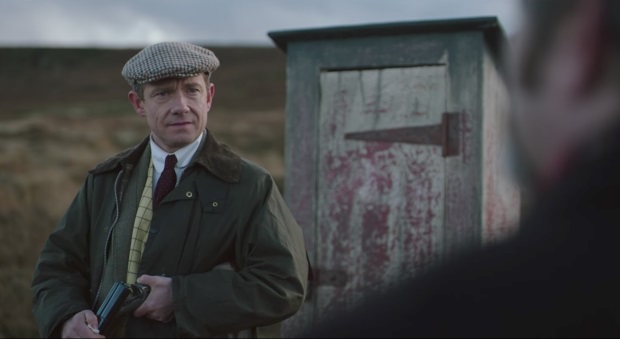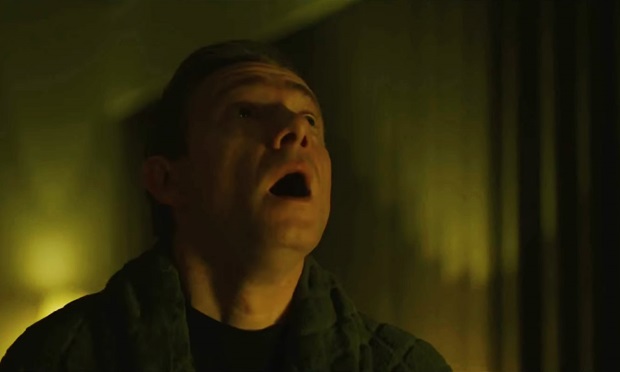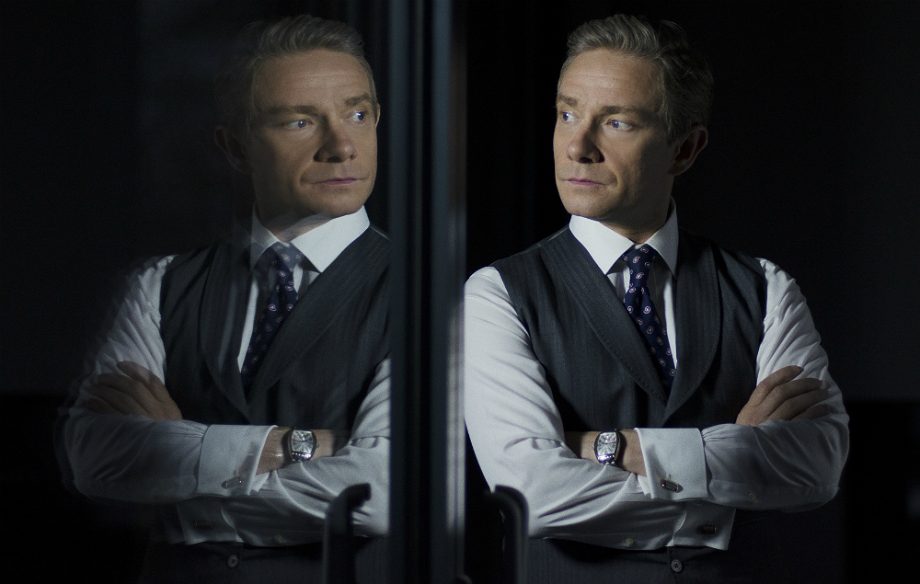Ghost Stories is about to be released in UK cinemas. It’s a great film; a deeply atmospheric and decidedly British horror. We were excited to get a chance to sit down with Martin Freeman to have a chat about his role in the film.
We didn’t have a lot of time, and we were dead keen to dig into his role in Ghost Stories, so we decided to put questions about some of his previous roles to one side for this occasion. Martin Freeman has been in some fantastic films and television shows, but we think we’d be doing everyone a disservice if we rushed past through everything to squeeze in quick questions about the likes of Black Panther, The Hobbit, The Office and The Hitchhiker’s Guide To The Galaxy (although those of you with a keen eye may spot a subtle attempt to cajole a little information about the status of Sherlock).
It came down to a choice between doing Ghost Stories properly or trying to get a little taste of a lot of different subjects. The latter doesn’t sound very satisfying.
However, in having a proper chat about Ghost Stories we ended up getting into heavy spoilers. We’ve bookended the appropriate section with spoiler warnings. We very strongly recommend that you do not read this section of the interview unless you’ve seen the film. Elsewhere, we’ve trimmed a few bits out that were spoilers.
Here’s how we got on with Martin Freeman.
How did you get involved in Ghost Stories?
Andy (Nyman) sent me the script, well Andy and Jeremy (Dyson) sent the script, after I worked with Andy on a BBC film a few years ago. He said “I’m gonna send you this, there’s a part in it for you.”
So I read it and it just rang a lot of bells, I suppose. It’s reminiscent, I guess, of certain films that me and Andy and Jeremy would have grown up watching on telly.
(Spoilers start here)
I’m really interested in asking you about the script, because it takes some odd turns. How easy was it to digest the script?
I had to read it a couple of times, definitely, because as you get to the last act, you’re like, hang on, what world am I in now? So, it was not easy. It took a couple of detailed goes.
And you presumably can just call them and ask them.
Exactly, yeah. And I did, I was able to go ‘So does that mean, hang on a minute, is that really…’ Because you get so, and I think you do when you watch the film, you get so into his story, ‘I’m a professor and I investigate the paranormal’. You go ‘oh, so that’s really true then’, then Andy went ‘Well, no, not really. It’s just another thing that he’s made up for himself in order to cope.’ That’s his subconscious making the world for himself in his state that he’s in at the end.
It’s more interesting because the biggest horror is in you. That’s the most horrifying stuff is the stuff that’s going on within you, which is stuff you can’t run away from.

Your role in particular has a few different angles to it. Was that something that attracted you to it?
Yes, definitely. It was a big part of it. Part of the covering note on the script was that Andy said, there’s an element of Sleuth to it. Sleuth was a movie that I watched as a kid. It’s where Michael Caine pretends to be Doppler of the yard for Lawrence Olivier. That was one of the films that, indirectly, made me want to be an actor. It’s the film that made me love Michael Caine. And way before I ever thought ‘I’m gonna be an actor’ I was attracted to that thing without really knowing why. So he had me at Sleuth really, as soon as he mentioned that I thought ‘I’ll read this!’
And yes, the chance to play the Charles Cameron role as well, it was amazing, with the fantastic make up.
So that’s you the entire time?
Yes, that’s all me. So I was walking around the set as him and people didn’t know. Because people just call me, I think we came up with the name Leonard Byrne. We thought, if we’re gonna get away with this we’ve really got to cover our backs, to give this guy his own IMDB page. He’s this older Scottish actor who’s been rediscovered for this part. And yeah, we got away with it on set. You did the voice and with the amazing make-up, a different walk.
I didn’t realise at all.
(Spoilers end here)
The physicality of your performance is really important. I wonder if you could break down for me what was required here.
Well, I guess there are just old truths or truisms about acting. Where your character is coming from, where he’s physically coming from, is sometimes quite useful to you. I find things that are practical a lot more help than things that are purely psychological. So, I find I’m not particularly prone to writing someone’s entire backstory, for myself, from the age of four. I don’t really do that. But I will say ‘where does he hold himself? Where’s his centre of gravity?’
So for Mike Priddle, and I could see it again last night as I sort of forget it because I don’t walk around with him in my head, but there’s a part with him in the nursery where he’s absolutely leading with his groin. So he’s a thrusting banker who takes no prisoners. A complete egomaniac who talks about his wife in a pretty disparaging way and he is kind of a walking member on legs. So that’s where his centre was. There’s a kind of ruthlessness about him.
I try and keep things simple for myself, so what are the few characteristics about this person that are applicable. Because you can get too bogged down with ‘Is he that? He’s that!’. You can’t play 12 things at once, but you can play a couple of things at once. Or at least I can.
Someone else might be able to play twelve things, I couldn’t. So you keep it economical for yourself. What are the things that are actually practicable to play, because acting is a physical act.
The thing is, sometimes you can get bogged down with the psychological and the academic, and you think actually as soon as you make your foot operate in a different way, that changes every other thing, it can change the way you feel. So if you hunch your shoulder for ten minutes you feel differently. If you do something to your neck for ten minutes, you feel differently. So you are already something different. You haven’t had to write a biography about him, you haven’t had to think ‘Where was he in 1989?’, you literally just make him different. You make him physically different. It gives you a different feeling. Speaking is a physical act, so you give him a different voice.
So, the material you have in the film, there are some disparate tones. Some of it is quite heavy. How does that translate to the on-set atmosphere?
I think it usually translates to a balance. In my experience the heavier something is, and this is the case in life as well, I think this is borne out in real life, in the heaviest moments that’s when comedy appears. The truth is, at funerals people do not spend the entire day crying and weeping. They don’t. They go to tea afterwards and, in my experience, within half an hour people are laughing and smiling and catching up. We as a species have a pressure cooker thing, we take the pressure off. We take the lid off and we’re able to express something lighter. And on the heavier films and TV I’ve done it’s always balanced, unconsciously, by people making jokes and people taking the piss. ‘Cause it would be a weary old world indeed if you were doing something heavy and then you were also being heavy at your tea break as well. No one needs that. I don’t think it creates good work at all.

I’ve had my last question nudge, so unless you’ve got some mega Sherlock exclusive you want to throw out today… (speculative silence)
Haha. No.
Fantastic. What’s your favourite Jason Statham film?
It would be Lock, Stock. I liked that film. I remember even at the time people were sniffy about that film in a way that, it was almost like people stopping themselves from laughing ‘cause they know they shouldn’t laugh. I think people wanted to like that film and then went ‘Oh, it’s just like this, that and the other, isn’t it?’ and then got immediately sniffy about it. But I liked it. It did feel new, even it was referencing old. What doesn’t reference old? Everything references old things. But I thought, clearly Guy Richie had a style with moving a camera around, he had a swagger about his filmmaking that I liked and I thought they were all really good.
I haven’t, I have to say, kept up with his action oeuvre, but he did some acting in Lock, Stock, and I know more about acting than I do about stunts.
Martin Freeman, thank you very much!
Ghost Stories is in UK cinemas from Friday.

